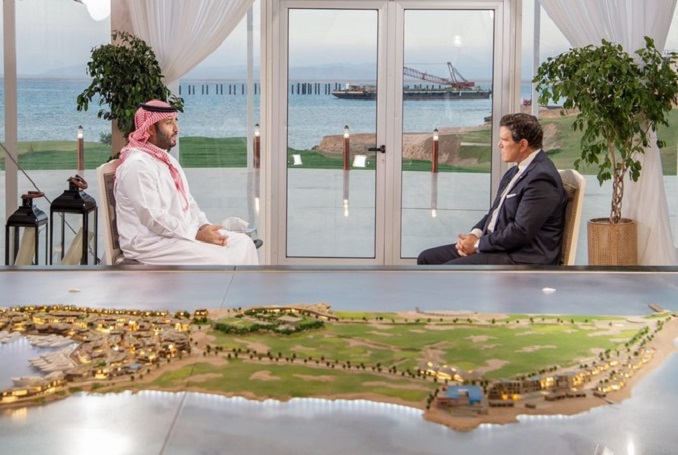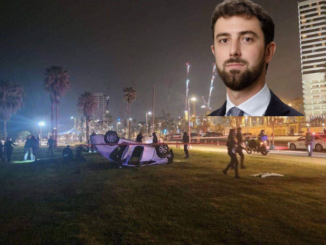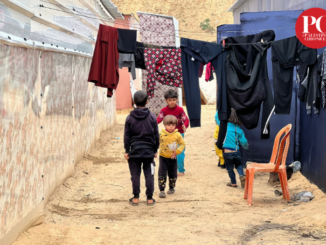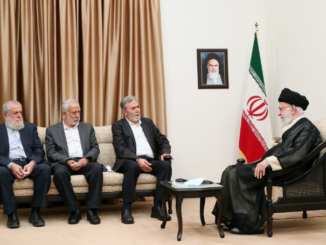
By Palestine Chronicle Editors
In an interview with the conservative US media channel, Fox News on Wednesday, September 20, Saudi Arabia’s Crown Prince Mohammed bin Salman spoke about Palestine, Iran, and normalization with Israel, among other issues.
Every major media, including pan-Arab media channels seemed to interpret what Bin Salman said differently, depending on their own political agendas.
US media focused mostly on the prospect of normalization with Israel, mostly relegating his references to Palestine and the rights of the Palestinians.
Pro-Saudi Middle Eastern media seemed to emphasize the latter and largely omit the former.
Arab channels that are not loyal to the Kingdom reiterated the US media line, thus focusing on normalization and little else.
But What Did Bin Salman Actually Say?
In general, the interview offered Israeli Prime Minister Benjamin Netanyahu a political lifeline.
But it remains unclear whether Netanyahu is willing to concede anything to the Palestinians, per Saudi expectations.
Yet without concessions, normalization might not be possible, especially since Bin Salman emphasized in the interview three major points regarding Palestine:
One, he said: “For us, the Palestinian issue is very important”, and “we need to solve that part”.
Two, “we got to see where we go.. we hope that will reach a place, that it will ease the life of the Palestinians, (and) get Israel as a player in the Middle East.”
Finally, and perhaps the clearest of all of his statements, he said:
“If we have a breakthrough, reaching a deal that gives the Palestinians their needs and (making) the region calm, we’ve got to work with whoever’s there.”
The latter emphasis was an answer to the question on whether the Saudis are willing to work with the likes of a rightwing leader like Netanyahu and his government.
For Bin Salman, the issue of normalization does not seem to be tied to an individual but is a strategic question for his country.
Selective Politics
Netanyahu would like to ignore this crucial fact. Instead, the Israeli leader wishes to interpret Bin Salman’s comments in ways that can be beneficial for Tel Aviv, and for Netanyahu personally.
What matters the most to Netanyahu is the idea that the Saudis are still committed to normalization talks, despite earlier reports by Saudi media that Riyadh has asked the US to freeze the conversation on a possible deal.
This is the comment which, for Netanyahu, matters most:
There had been “good negotiations” so far, and “every day, we get closer.”
This gives the embattled Israeli leader hope for two reasons:
One, he can always sell his people the idea that the economy of Israel could still recover its massive losses – estimated at 60 percent in the first three quarters of 2023 – in foreign investments.
Tel Aviv’s Losing Brands: Israeli ‘Coup’ and the Death of False Democracy
Two, he can buy time to keep his extremist coalition at the helm of Israeli politics.
The second point, however, is as much an advantage as it is a disadvantage.
As the Israeli prime minister was heading to the US to take part in the United Nations General Assembly meetings, a number of influential Israeli parliamentarians from the Likud party warned him not to make any concessions to the Palestinians as part of a future Saudi-Israel normalization deal.
If Israel makes a single meaningful concession to Palestinians, or even a symbolic reference to their sovereignty over East Jerusalem, the West Bank and Gaza – as confirmed in international law – his coalition will surely collapse.
If he doesn’t, the Saudis would find it difficult, if at all possible, to move forward.
This takes us back to Bin Salman’s comments, some of which raised yet more questions:
By stating that “for us the Palestinian issue is very important”, does it mean that this ‘issue’ would have to be resolved as a precondition to normalization?
What did he mean by “easing life of the Palestinians? – as this could mean anything between granting a few thousand workers permission to work inside Israel, to Palestinian freedom from the yoke of the Israeli military occupation.
Strategic Ambiguity
The Crown Prince was intentionally vague.
Some claim that this is his first ever media interview in English, while others report that it was a ‘rare’ one.
Bin Salman conducted the interview while fully aware of the elephant in the room, mainly the murder of Saudi journalist Jamal Khashoggi in 2018.
Bin Salman discussed the subject as a matter of security flaw that needs to be addressed through “reform(ing) the security system” of the country so “these kinds of mistakes do not happen again.”
“It was a mistake. It was painful,” Bin Salman said, asserting that “everyone involved” is serving, or will serve jail time.
His seemingly ‘balanced’ view on Palestine was directly linked to his need to present the issue of Khashoggi’s murder in a non-confrontational way, with the hope of moving past this tragic chapter altogether.
However, his views, though communicated carefully, didn’t seem to contradict the declared Saudi position on normalization, dating back to the Arab Peace Initiative of 2002.
Ahead of Netanyahu-Biden Meeting, Likud MKs Warn against Making Concessions to Saudi Arabia
If anything new was gleaned from the interview is that the normalization talks between Israel and Saudi Arabia are still moving forward.
On Iran, US Politics
US media, both liberal and conservative, gave greater emphasis to certain words and phrases in the interview and relegated others. Why?
The conservatives want to utilize any potential normalization between the Saudis and Israel as part of the so-called Abraham Accords, facilitated by the Donald Trump administration during his term in office.
The liberals are desperate for a foreign policy breakthrough before the start of the presidential election season, so that President Joe Biden may improve his leadership status.
The same logic applies to Bin Salman’s comments on Iran.
“We are concerned of any country getting a nuclear weapon”, he said, but if Iran built one, the Kingdom would have “to get one” as well.
Israel is known for having a massive nuclear arsenal. Iran, on the other hand, is yet to obtain nuclear weapons, and there is no evidence that Tehran is seeking such nukes.
Corporate media, however, portrayed Bin Salman’s statement as a direct threat to Iran, completely ignoring the fact that Israel’s nukes are the main existential threat to the Middle East region.
Coming days and weeks will offer greater clarity regarding what the Saudi Crown Prince meant – or didn’t mean.
For now, Netanyahu will do his utmost to capitalize on the continued normalization talks with one of the richest countries in the Middle East, in fact, the world.
Report: Saudi Arabia Freezes Normalization Talks with Israel over Palestine
(The Palestine Chronicle)







